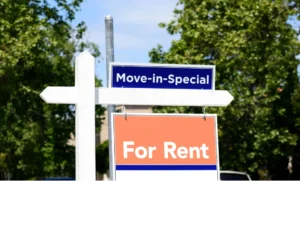
Should Landlords Accept Partial Rent Payments?
The Big Picture On Should Landlords Accept Partial Rent Payment:
- Accepting partial rent from one tenant but not another could be seen as discrimination, opening you up to lawsuits. Landlords must treat all tenants consistently. Accepting partial payments might set a bad precedent and make tenants less likely to prioritize paying rent on time in the future.
- Partial payments can make bookkeeping complex, especially when dealing with late fees and multiple units. It’s best to keep things clear by only accepting the full rent amount.
- If you really need to accept partial rent payments, protect yourself through clear documentation, well-outlined policies, charging full late fees, and putting everything in writing.
Just about a year ago, more than 5 million households in the US were behind on rent, and that number doesn’t seem to decrease anytime soon, but rather increasing. Nearly every landlord has heard it: “I can give you $500 now — I swear I’ll have the rest of the rent to you by Friday!”
Ah, partial rent payments, how I loathe them. They are a sticky trap for many landlords.
While most landlords are fundamentally nice people who want to help their tenants out when they’re in a bind, you really shouldn’t accept partial rent payments. They may seem innocuous enough, but they come with a multitude of risks for landlords.
What Is Partial Payment?
A partial payment is when a tenant pays less than the full rent amount they owe for the month. For example, if your tenant’s monthly rent is $1200, the partial payment could be $13, $623, or $1199—any amount below $1200 is considered a partial payment.
This can happen for various reasons, though the landlord decides whether to accept a partial payment from a tenant. There are factors to consider, perhaps helping a struggling tenant while potentially delaying receiving all the rent owed—more on that later.
Commons Reasons Why Tenants Pay Partial Rent
An estimated 3.7 million eviction cases are filed by landlords across the country every year. As a good landlord, you should remember that there are a few possibilities as to why tenants choose not to pay rent in full—don’t just evict them right up. While some might want to test your patience, others have their reasons.
|
Reasons |
Explanation |
|
Insufficient funds |
Tenants might not have enough money available when the rent is due, leading them to propose a split payment arrangement to extend their financial resources. |
|
Financial setbacks |
Unanticipated expenses, such as healthcare costs or vehicle repairs, can disrupt a tenant’s budget, potentially impacting their ability to cover rent in full. |
|
Reluctance to pay full rent |
High rental costs can sometimes lead to tenants questioning the value, opting to negotiate partial payments in response to dissatisfaction or a desire to reduce expenses. |
|
Ongoing property issues |
Tenants faced with incomplete maintenance or renovations upon moving in may seek to adjust their rent payments accordingly until the promised conditions are met. |
|
Unlivable conditions |
When a property fails to meet living standards, tenants may withhold full rent payments until the necessary improvements are made to ensure the space is safe and compliant. |
Why You Shouldn’t Accept a Partial Payment
Last November, small business rent woes worsened as 41% nationwide couldn’t pay rent. Most novice landlords instinctively want to accommodate their tenants and offer flexibility. It feels like kindness, which all good people aspire to.
But you’re running a business, and a heavily regulated one at that. This means there are legal considerations for partial payment when you bend the rules for your renters, such as accepting a partial rent payment.
Need Legal Help?
Chat with a real estate lawyer near you. It’s only $5 for a 1-week trial. Ask unlimited questions.
You Have to Restart the Eviction Process
The first and most dire reason to never accept partial rent payments is that, in many states like California, a partial rent payment terminates the eviction process, which means the landlord must restart it from scratch.
Imagine the following scenario: Your tenant makes a partial payment at the beginning of the month, promising to pay the rest of the rent soon. You delay filing eviction out of the kindness of your heart, but the rest never comes.
Eventually, you get wise enough to think that “just one more week” is a repeating refrain. You serve the eviction letter notice, file for eviction, get a hearing scheduled, attend the hearing, and get approval from the judge to proceed. Then, the tenant pays you $1 the day before the lockout date.
The eviction case is closed. You’ll start from scratch, with thousands of dollars owed in back rent.
Discrimination Risk
If you accept partial rent payments from one tenant and refuse to accept them from another, tenants (and their ambulance-chasing attorneys) can construe it as discrimination.
This is based on Fair Housing lawsuits. Even if you win — far from guaranteed in today’s legal climate — it’s a terrible look for you as a landlord, which says nothing of the legal fees you incur to defend yourself.
Landlords cannot treat one tenant differently from another, ever, as this can lead to discrimination lawsuits.
Muddied Accounting
It doesn’t do your accounting any favors when you receive $300 here, $400 there, and another $279.83—all for different rental units and at different times.
When tenants get behind on rent, late fees pile up, and then multiple months’ rent gets complicated. You suddenly have to track the “priority of debts” and pay them in the correct accounting order.
And it does matter from a legal perspective. In many states, you can’t include late fees as part of the rent balance due when filing for eviction.
Keep your accounting clean by only accepting the full rent owed at any given moment.
Late Fee Disputes
Technically, landlords can (and should!) charge full late rent fees even if the tenant pays part of the rent on time and the rest late. In fact, your lease agreement should explicitly state that the late fee becomes due if the rent is not paid in full by the end of the grace period. As a landlord, the most you can charge as a late fee is 5% of your tenant’s monthly rent.
However, some activist judges are so tenant-friendly that they see themselves as “defenders of the downtrodden,” they side with the tenant regardless of the facts or the legal basis. Before you accuse me of hyperbole, I’ve seen it happen with my properties. It once took me 11 months to evict a professional tenant who knew precisely how to play the game with judges.
The law was on my side—and it didn’t matter at all.
Behavior Management & Incentivization
Deni and I talk about it all the time: your tenants will try to push your boundaries. It’s simply human nature.
Many will try paying their rent on the third, fifth, and tenth of each month. We all have bills; some come with stiffer penalties than others when we delay paying them. If the utility company reports their late payment to the credit bureaus and hits them with a 10% late charge, and you won’t do anything if they pay the rent late, who do you think your tenant pays first?
It’s up to you to draw and defend the boundaries in your lease agreement. The rent is due in full on the first of the month. Period. If the tenant fails to pay it in full by the end of the grace period, they receive an eviction notice letter and owe a late fee.
Most tenants will do it once to test your boundaries. They’ll prioritize the rent over their other bills as soon as they see that you mean business.
In The End, You Get The Short Stick
The last but not least reason not to accept partial payments is that you’ll be the one to bear the brunt of future issues. Whether they’re financial, legal, physical, mental, or any combination of the lot, they will be your headache.
Besides, suppose you have rental properties in different states. In that case, you get the additional privilege of navigating different state laws around partial payments, so that’s more time sunk on something you could have avoided.
How Should You Handle a Partial Rent Payment as a Landlord
First, it’s worth noting that you can require all rent to be paid online through a landlord software platform. An online rent collection service lets you select whether to accept partial payments when you request the rent or security deposit.
That gives you complete control over accepting or declining payments. It’s far harder when you receive a money order in the mail.
But if you do receive a partial rent check or money order in the mail, don’t deposit it. Call your tenant and let them know you received it but are not accepting it or depositing it until they pay the remaining balance. They can either come to pick it up from you in person or send the full unpaid rent online.
That doesn’t mean you should be a jerk about it. Just explain politely and professionally that you don’t accept partial payments as a matter of policy, like most businesses.
Use the opportunity to ask your renter what caused the delinquent rent payment. If they’re simply having trouble budgeting, you can offer to switch to a biweekly rent payment plan. SparkRental’s online rent collection service lets the tenant set up automated recurring payments on a weekly, biweekly, or monthly basis.
That can get the money out of their bank account before they even have a chance to spend it.
Make It Easier For Your Tenants by Accepting Credit Cards
Offer your tenants an easy out: they can pay the rent balance on their credit card if they’re in a pinch this month.
Yes, they’ll pay a small credit card convenience fee. But it’s still cheaper than paying your late rent fee, and they stay in your good graces to boot.
You get to offer reasonable accommodation when your tenants are in a bind while still enforcing your lease agreement and rent policy. Everybody wins.
Rules When You Do Accept Partial Rent Payments
Consider yourself warned if you handle partial payments. But if you can’t help yourself and feel compelled to accept the occasional partial rent payment, follow these rules to limit the risk and damage.
Consider The Circumstances
When COVID hit, tenants were given some leeway in rent payments. The situation called for it, so landlords had to be flexible. That’s perfectly reasonable and underlines why it’s important to consider the bigger picture when allowing partial payments.
You also don’t have to be the one to get your tenants the needed help. Consider referring them to solutions like rental payment assistance, like the one the CFPB offers. Some communities offer similar assistance programs, and again, you can simply tell your tenant to look them up and see what works for them.
Make Your Partial Payment Policy Crystal Clear From The Get-Go
If you want to accommodate partial payments, outline everything in black and white as soon as possible.
And when I say black and white, I mean documentation across the board. I mean open and clear lines of communication, or recording any payment plans, if any, along with relevant recordings or screenshots.
Having signed and clear-cut policies will help avoid claims like “I didn’t know,” which happen more often than people expect. They also offer limited protection from future legal issues and are a good thing to have when things escalate to eviction.
Never Accept Partial Payments After Filing Eviction
The first and most important rule of all: once you start the eviction process, you never accept partial rent payments. They must pay the entire balance due, or they must vacate.
End of story. No further discussion. You don’t want them paying $1 simply to close the eviction case and make you start it over from the beginning.
Always Charge the Full Late Fee
There must be consequences when your tenant fails to pay their rent on time. One of those consequences is paying the late fee.
Your mortgage lender doesn’t buckle and say, “Aww, you poor thing, of course, I’ll waive your late fee because your sob story is so touching.” They are a business. You borrowed money from them and agreed to pay it back. Fail to live up to your obligations, and they first hit you with late fees, then they repossess your home through foreclosure.
You are a business, too, and if you don’t think of yourself as being in business, you shouldn’t invest in rental properties. Buy stocks index funds or shares in private REITs like Fundrise or Streitwise, and save yourself a world of headaches and financial losses.
Always Serve the Eviction Notice Letter Immediately
The other consequence of failing to pay the rent on time is that the landlord starts the (usually long) eviction process. This begins by serving an eviction notice letter, giving the tenant a second grace period to pay the remaining balance in full.
Serving the eviction notice is a prerequisite for filing in court for eviction. It costs you only postage because we offer templates for eviction notices for each state.
Besides, the longer you delay, the more back rent will pile up. It’s not good for you, and it’s certainly not good for the tenant.
Put One-Time Exceptions in Writing
If you make a one-time exception and extend the period before the rent becomes late by a few days, write it. Sign a simple one-page agreement with the renter for delayed or partial rent, stating the date the rent becomes late and triggers a late fee. Explicitly state that this represents a one-time special exception.
Consider also swearing the tenant to secrecy about it. Remember, you become guilty of discrimination when you adopt one set of rules for one tenant and another for your other tenants. Offering one tenant special treatment breaks Fair Housing laws—one more reason you shouldn’t accept partial payments.
Tips To Avoid Delayed or Partial Rent Payments
Thorough Tenant Screening: Thoroughly vet potential tenants before signing a lease agreement. You can verify their income to ensure they can afford the rent and check references to understand their history of on-time payments.
Clear Lease Agreement: Your written lease agreement must emphasize the rent amount, due date, late fees, and consequences for partial and late payments. This will also come in handy in court if everything goes wrong.
Online Payment System: Offer convenient online payment options that encourage tenants to pay the full rent simultaneously. You’ll have options if you allow partial rent payments from tenants, decide to accept rent in a bi-weekly plan, and more.
Automatic Payments: You can set up an automatic payment system with your tenants. The payments get deducted from their bank account even before they can spend it on other things—with their permission. This way, you know that rent will be on time and in full payment.
Communication: As a landlord, it’s your job to maintain good communication with your tenants. Let them know that you have your ears wide open. They only need to reach out well in advance if they foresee difficulty paying rent on time.
Charge Full Late Fees: Implement clear late fees to discourage partial and late rent payments. It may sound a bit harsh on your tenants, but that’s just a way for you to avoid situations that aren’t beneficial for both of you.
FAQs About Partial Payment of Rent
Which of the following is the greatest landlord risk of accepting a partial rent payment?
The greatest landlord risk of accepting partial rent is waiving eviction rights for non-payment of total rent.
Can you be evicted if you pay partial rent in Texas?
In Texas, yes, tenants can be evicted for paying partial rent. Landlords are not required to accept partial payments and can start eviction proceedings for the full amount owed.
Can you be evicted if you pay partial rent in California?
Yes, partial rent payments in California can still lead to eviction. Even you as a landlord accepts some money, you can still evict your tenants for the remaining balance unless there’s a written agreement for repayment.
Can a landlord evict you if they accept a partial payment in Florida?
In Florida, accepting partial rent after a 3-Day Notice to Pay or Vacate usually prevents eviction for that month’s rent. However, you still owe the remaining balance.
Can a landlord evict you without going to court in Florida?
No, landlords in Florida cannot evict without going to court. You must follow a legal eviction process, and forceful removal is illegal.
Final Thoughts
Enforcing your rental agreement and late rent payment policy is one of the hardest parts of being a landlord. Normal, middle-class people instinctively want to help each other out. But the same instinct that makes you a good friend, colleague, or neighbor makes you a bad landlord.
Defend your boundaries, especially when it comes to payment of rent and your late fee policy.
If you struggle with this, hire a property manager to collect rent for you. They can handle nonpayment of rent and eviction proceedings on your behalf.
Source: SparkRental













 Accessibility
Accessibility